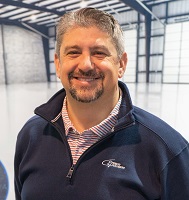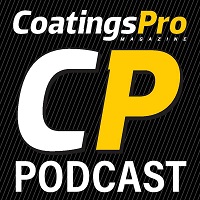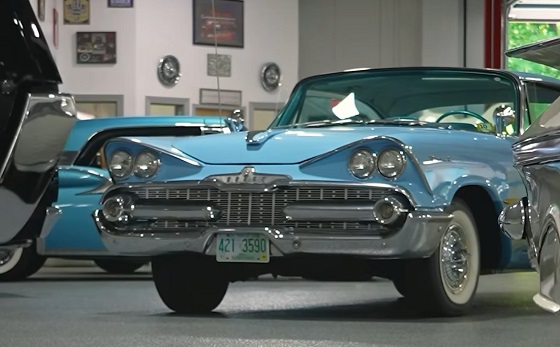Kaveh Meghdadpour, director of national accounts and business development and the East region manager at Crown Polymers, recently joined a sponsored episode of the CoatingsPro Interview Series.
Discussion topics on the podcast included industry trends and pain points within floor coatings; successful case studies using Crown solutions; the importance of manufacturers and contractors working together; and strategies to address potential industry concerns in the years ahead, such as workforce development.
Read on for snippets of our exclusive Q&A interview, and listen to the full conversation online at www.coatingspromag.com/podcasts or at the embedded link below.
Q: Can you tell us more about the company and its customers and industries served, as well as where our listeners can get your coating products?
 Meghdadpour: A little background: First, Crown Polymers is part of California-based Polycoat Products, an industry leader in polyurethane and polyurea flooring and surface systems.
Meghdadpour: A little background: First, Crown Polymers is part of California-based Polycoat Products, an industry leader in polyurethane and polyurea flooring and surface systems.
For over 30 years, Crown has manufactured high-performance epoxy, urethane-based floor coating products, and concrete repair systems for residential, commercial, and industrial floors. Some applications in each of these include garage flooring is typical for a residential installation; commercial floor coatings include automotive garages and car dealerships; and airplane hangars, wineries and food processing plants are examples of where our floor coatings are installed in industrial applications.
Despite our extensive industry experience, many contractors and end-users don’t know about us outside of our main manufacturing and distribution areas in the Midwest, California, and Texas. But we know that conversations like this will help raise awareness.
Q: You’re an American manufacturer, but what are the implication of overseas suppliers in the market?
Meghdadpour: Unfortunately, manufacturers like Crown Polymers are feeling the effects of overseas competition because these companies are bringing raw material into the county and avoid FTC-issued [Federal Trade Commission] tariffs. Specifically, these suppliers import raw material into North America, produce the products in their country, and sell in the United States for lower prices.
 Crown Polymers is proud that all of our products are manufactured completely in the United States. This supports the local economy in each community in which we’re located, and it helps local jobs growth.
Crown Polymers is proud that all of our products are manufactured completely in the United States. This supports the local economy in each community in which we’re located, and it helps local jobs growth.
Q: Can you tell me more about the floor coating products, and perhaps share a recent real-world example of a project that utilized Crown Polymers?
Meghdadpour: As a privately held company, something that sets the company and products apart is our ability to manufacture both ready-made floor coatings as well as engineer custom coatings exclusive to end-users’ unique specifications. We also partner with local installers across the country who have the highest commitment to floor coatings excellence.
One product I’m particularly excited about is our thin-set terrazzo floor-coating solution. This system seamlessly merges aesthetics with high-performance features. Meeting rigorous industry standards, NTMA [National Tooling & Machining Association], TTMAC [Terrazzo, Tile, Marble Specification, Standards & Testing], USDA [United States Department of Agriculture], FDA [Food and Drug Administration], and the Food and Safety Modernization Act, this epoxy floor coating system exemplifies a commitment to quality and safety.
I’d like to also note that it meets Green Seal and LEED [Leadership in Energy and Environmental Design] certifications, which means that the thin-set terrazzo system not only delivers an aesthetically distinctive and durable floor coating solution but also aligns with environmental building practices.
An example of a recent project that utilized some of our best-selling coatings is at RCC Classics, a classic car museum dedicated to showcasing classic cars from the 1950s through 1970s, in Dracut, Massachusetts. A previously installed floor coating was failing — when the museum’s team drove cars in the facility, uncured resin squirted onto the antique vehicles
from the flooring.
The owner reached out to Bryan Coulombe, owner of New Hampshire-based Granite State Epoxy, to rectify the situation. Bryan assessed the situation and the requirements to fix the 4,000 square feet (371.6 m2) of compromised flooring system. After explaining the process and materials to the museum owner, Granite State Epoxy was retained for the project and got to work.
First, the crew ground the epoxy down to the concrete base; evaluated the concrete; and then let this breathe for one week. The second step was the application of Crown Polymers three-component — “A through C” — urethane 814 cement system (814 CrownCrete U ¼).
This moisture-tolerant, high-performing flooring is applied 1/8-inch to 1/4-inch thick (3.2 to 6.4 mm). After combining all three components, the team poured it over the cement floor, and spread out this self-leveling system, which provided a perfect finish.

The following week, the team applied our Crown Polymers 8320S epoxy base coat for superior adhesion and performance. This was then sanded to ensure a proper mechanical bond for the next step that involved squeegeeing, back rolling, and flaking into the wet product. When this cured, the flake was stuck to the epoxy, providing durability and pleasing aesthetics.
The final process included scraping the flakes that were applied the previous day and then vacuuming the entire floor. After this, the crew walked the floor to ensure there weren’t any imperfections and to fix any flaws they may have found.
Finally, the team applied the easily installable Crown Polymers polyaspartic topcoat, which provides durability and performance characteristics. While this product cures within four hours, Bryan allowed 24 hours to make sure it was completely dry and set.
The owner of RCC Classics is delighted with the floor’s aesthetics and confident the new system will withstand the cars’ weight for many years. Additionally, because of our product engineering, these floors are slip and chemical resistant.
Q: Wow, what an interesting project. Earlier, you mentioned working with installers across the country. Can you tell me about these relationships and what you do to foster them?
Meghdadpour: It’s critical that installers be familiar with our products, the most effective way to apply them, and which products are ideal for the many projects they work on. To that end, we offer in-depth contractor training, either at their facilities or our manufacturing plants.
These sessions include testing materials, teaching prep work, discussing mixing techniques and drying times, troubleshooting possible problems, and examining various installation steps. We want our contractors to be successful and their customers to experience the benefits of a properly installed, long-lasting floor coating.
Q: That sounds like a very customer-centric approach. How can our listeners learn more about Crown Polymers?
Meghdadpour: They can check out our newly redesigned and relaunched website at www.crownpolymers.com. They can also check out our social media pages with updates on projects, new products, and where they can find us at industry trade shows.
Which reminds me, we’ll be at booth number S10843 at the 2025 World of Concrete tradeshow from January 21-23. We hope people will stop by to learn about our innovative floor coatings and how we can help them with their next project.
Meghdadpour offered additional insight in a recent episode of the CoatingsPro Interview Series. To hear the complete podcast interview, listen below.